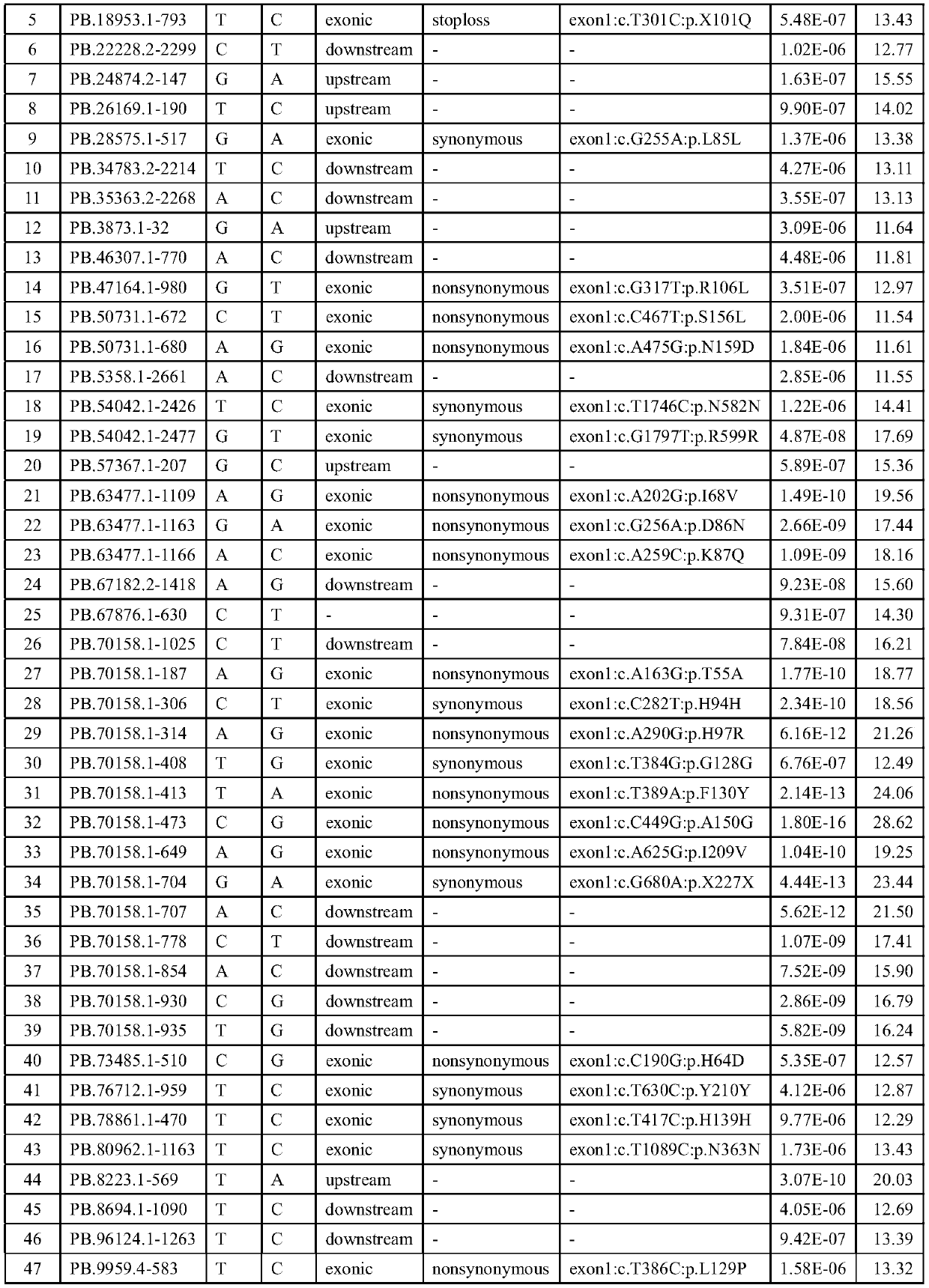SNP molecular markers related to content of linolenic acid in camellia seed kernel oil and application of SNP molecular marker
A technology of molecular markers and linolenic acid, which is applied in the field of molecular biology and genetic breeding, can solve problems such as the late start of assisted breeding research and the obstacles to mining key regulatory genes of Camellia oleifera
- Summary
- Abstract
- Description
- Claims
- Application Information
AI Technical Summary
Problems solved by technology
Method used
Image
Examples
Embodiment 1
[0223] Example 1 Construction and Character Determination of Linolenic Acid Content Segregation Population in Camellia Camellia Oil
[0224] In this example, common Camellia oleifera resources are used to collect natural populations of 500 germplasm resources in the nursery, and their origins cover most of the main Camellia oleifera producing areas in my country, including Zhejiang Province, Hunan Province, Jiangxi Province, Guangxi District, Fujian Province, and Guangdong Province. Province etc. After the fruit of 500 individuals is fully mature (5% of the fruit is cracked), the seeds are collected respectively, and the oil is extracted to determine the fatty acid composition and content. The operation steps are as follows:
[0225] (1) Appropriate amount of Camellia oleifera seeds were baked in an oven at 80°C overnight until constant weight, and the hard seed coat was peeled off.
[0226] (2) After the seed kernels are pulverized with a grinder, they are wrapped with mediu...
Embodiment 2
[0229] Example 2 Transcriptome sequencing and annotation analysis of the third generation Camellia oleifera
[0230] 1. Extraction of RNA from three-generation sequencing samples
[0231] The roots, young leaves, mature leaves, petals and immature seeds of camellia oleifera "Changlin No. 4" were collected, and RNAprep Pure polysaccharide polyphenol plant total RNA extraction kit (spin column type, TIANGEN kit Code No. DP441) was used to extract respectively RNA, the specific steps are as follows:
[0232] (1) First add 500 μl of Lysis Solution SL (beta-mercaptoethanol was added in advance) to a 1.5ml centrifuge tube. Take 0.1g of the sample material and add liquid nitrogen to fully grind, quickly add the ground powder into the centrifuge tube, and immediately vortex vigorously to mix.
[0233] (2) Centrifuge at 12000 rpm for 2 minutes.
[0234] (3) Transfer the supernatant to the filter column CS (the filter column CS is placed in the collection tube), centrifuge at 12000rp...
Embodiment 3
[0247] Example 3 Seed Kernel Transcriptome Sequencing and Polymorphic Site Identification During High-speed Synthesis of Oil
[0248] 1. Extraction of total RNA from seeds of 500 Camellia oleifera clones during high-speed oil synthesis
[0249] The total RNA of the immature kernels of each clone was extracted by RNAprep Pure Polysaccharide Polyphenol Plant Total RNA Extraction Kit (spin column type, TIANGEN Kit Code No. DP441) (see Example 2).
[0250] 2. Next-generation transcriptome sequencing
[0251] The total RNA of each sample was tested for purity and concentration, and the ribosomal RNA was removed to maximize the retention of all codingRNA and ncRNA. The obtained RNA is randomly fragmented into short fragments, and then the fragmented RNA is used as a template to synthesize the first strand of cDNA with six base random primers (random hexamers); then buffer, dNTPs (dUTP instead of dTTP), RNase H are added The second strand of cDNA was synthesized with DNA polymerase...
PUM
 Login to View More
Login to View More Abstract
Description
Claims
Application Information
 Login to View More
Login to View More - Generate Ideas
- Intellectual Property
- Life Sciences
- Materials
- Tech Scout
- Unparalleled Data Quality
- Higher Quality Content
- 60% Fewer Hallucinations
Browse by: Latest US Patents, China's latest patents, Technical Efficacy Thesaurus, Application Domain, Technology Topic, Popular Technical Reports.
© 2025 PatSnap. All rights reserved.Legal|Privacy policy|Modern Slavery Act Transparency Statement|Sitemap|About US| Contact US: help@patsnap.com



